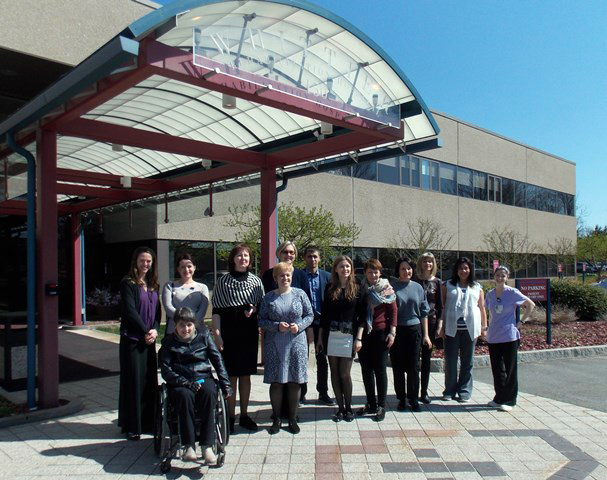Courtesy of the Community Advocate | Westborough – A delegation from Belarus visited Whittier Rehabilitation Hospital in Westborough April 14. The group, made up of 10 professionals in the field of therapeutic rehabilitation, took a tour of the facility and spoke with administrators and therapists about Whittier’s approach and model of services.
The nine women and one man in the delegation came from very different regions in Belarus, from the rural area near the border with Poland to the more metropolitan area closer to Russia.
The visit to Whittier was the first stop on a three-week trip through the program, “Rehabilitation Services for Youth & Children with Disabilities,” organized by Community Connections, a partnership between the International Center of Worcester, World Learning (based in Washington, D.C.) and USAID. Community Connections is designed to promote public diplomacy through the exchange of cultural ideas and values between participants, U.S. families and local community host organizations.
The delegation visited a variety of Massachusetts’ facilities to explore best practices, expand their networks and learn about U.S. models and methods.
Whittier Rehabilitation Hospital is an acute rehabilitation hospital, equipped to provide complex medical treatments and procedures to patients who are acutely ill, have multiple complications and those who require specialty care and continuous monitoring, requiring a longer length of stay. At the Westborough location, Whittier consists of a 19-bed Transitional Care Unit specializing in aggressive, short-term rehabilitation for its patients and also provides a range of inpatient services, such as speech, occupational and physical therapies.
“We offer three levels of care under one roof,” Administrator Rebecca Roman explained to the group. “We are family owned and operated since 1982, which makes us different than most other facilities in this area.”
The delegation had many questions for Roman, Director of Rehabilitation Leah Carlin and other staff, which they asked through an interpreter.
“They are focusing on how we do it, more than what we do,” Roman said. “How did we get there and what we are still working on.”
Members of the delegation seemed quite impressed by the facilities at Whittier, particularly “Whittier Way,” a re-creation of a street scene indoors, complete with sidewalks, ramps, a market, a café, an ATM and an actual car so that patients can practice getting around. It also has a golf simulator, which helps with movement and balance.
“I really enjoyed the visit to Whittier Rehab,” said Liudmila Shabeka, head of the General and Clinical Medicine Department at Polessye State University in Belarus. “It allowed me to learn more about the specialized rehabilitation process in the U.S. What impressed me most was seeing the multi-faceted model and the joint effort between the different entities. In Belarus our rehabilitation facilities and day programs are structured differently and tend to focus on one or two specific disabilities…”
What also stood out among the visitors was the sheer size of Whittier.
“It is much bigger and there is more equipment than most rehabilitation facilities in Belarus,” said Dzianis Vasilevich, from the Association of Wheelchair Users in Minsk.
The delegation also visited organizations in Worcester, including Easter Seals, Seven Hills, the Center for Living and Working, Audio Journal, Canines for Disabled Kids, and other Massachusetts destinations such as the Learning Center for the Deaf and Perkins School for the Blind.
The group was also able to spend a day sightseeing in Boston and a weekend in New York City to shop, sightsee and enjoy the musical “The Lion King” before returning to Belarus.



